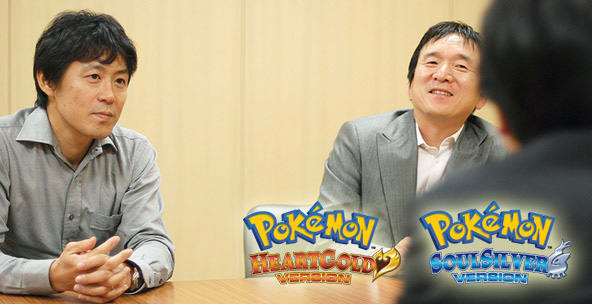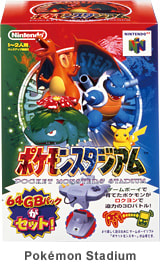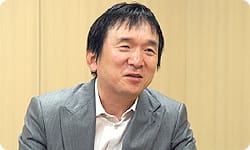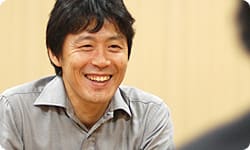Just Being President Was A Waste!
But even so, the original Pokémon Gold and Pokémon Silver had a very difficult birth.
Those titles were released in November 1999 which means that it took three and a half years to complete them.
Actually, at that time we had very few programmers. That wasn't just the case for Pokémon Gold and Pokémon Silver but for Pokémon Red and Pokémon Green as well. There were only about four programmers.
That's really a tiny number. Making a game on that scale with so few programmers would be unthinkable these days. And the way those games were put together was very complex.
What's more, though we were creating the games with a very small team, we were very greedy in terms of all the features we wanted to include in the games. I think that may be why they experienced such a difficult birth.
And then, just when Game Freak was snowed under with the development of Pokémon Gold and Pokémon Silver, discussion of producing overseas versions began.
Pokémon Red and Pokémon Green had turned into such a phenomenon in Japan that we were requested to release them in America. But working on the overseas versions was going to set back the development of Pokémon Gold and Pokémon Silver even further.
Although I wasn't working for Nintendo at that stage, I ended up acting as a go-between for Nintendo and you for some reason. (laughs)
That's right.
At that time I wasn't a Nintendo employee but was President of HAL Laboratory. At the same time, I was a board member at Creatures Inc. and I ended up being involved in analyzing the best way to localize the overseas versions of Pokémon Red and Pokémon Green. For that reason, I got hold of the source code for Pokémon Red and Pokémon Green and I would study that and suggest ways to localize it to the relevant department at Nintendo.
At the same time, Pokémon Stadium16 came out...
16. Pokémon Stadium was a game released in Japan on 1st August 1998 for Nintendo 64 that allowed players to have battles between 3D Pokémon and manage their Pokédex. It was compatible with Pokémon Red, Green, Blue and Yellow.
Right. (laughs) You decided to release Pokémon Stadium for the Nintendo 64 and the first task was to analyze the Pokémon Red and Pokémon Green battle logic and send it over to Miyamoto-san and his team. You'd normally expect there to be a specification document, but there was nothing of the sort...
I'm so sorry! (laughs)
No, no, it's fine! (laughs) Studying the program for the Pokémon battle system was part of my job.
I created that battle program and it really took a long time to put together. But when I heard that Iwata-san had been able to port it over in about a week and that it was already working... Well, I thought: "What kind of company president is this!?"(laughs)
(laughter)
I was saying things like: "Is that guy a programmer? Or is he the President?"(laughs)
To be blunt, at the time I was more of a programmer than I was a company president. (laughs)
(laughs) I was really taken aback that you could get to grips with such a complicated program in such a short space of time.
I remember thinking that there just weren't that many people out there who would be able to read the entire Game Boy source code, which was by no means written in a highly-refined programming language, and grasp how everything connected with everything else. So Iwata-san, you analyzed the whole thing and reworked the code, decided on the way to localize Pokémon Red and Pokémon Green, got the battle system running on N64... I was surprised that you managed all of that...
Well at that time, I felt that for the whole team at Nintendo, the biggest priority was not to do anything that would adversely influence the development of Pokémon Gold and Pokémon Silver. So I very naturally slotted in on the development side for Pokémon.
What's more, there were the tools for compressing the Pokémon graphic code...
Ah yes, the compression tools.
You were kind enough to create those tools.
Yes. (laughs) Well, I had heard from Ishihara-san that you'd been rather concerned about it.
At that point, we got a little carried away and were making all sorts of demands, saying: "This part isn't quite right - do you think you could fix it?" We had some nerve to be making those requests to a company president... (laughs)
Well, I was willing to do whatever I could! (laughs)
It would have been a waste to just have you as President! (laughs)
(laughs)
Being able to participate in that small way in Pokémon, I came to feel a real affinity for the software. In any case, while it was tough going, Pokémon Gold and Pokémon Silver were successfully released.
I remember that when Pokémon Gold and Pokémon Silver were released, I felt like a burden had finally been lifted from my shoulders. We'd had our sights set on the finish line of Pokémon Gold and Pokémon Silver for so long, and now that we'd finally completed the major series running right through from Pokémon Red and Pokémon Blue, I felt I could say to Tajiri-san: "I've fulfilled my duty!"
But that didn't turn out to be the finish line.
No, it didn't turn out to be the finish line! (laughs) Once we'd released Pokémon Gold and Pokémon Silver and it was selling even faster than Pokémon Red and Pokémon Green, I couldn't very well get off the ride halfway through saying: "Nice work everyone. Good luck from here on in!"
When Pokémon Gold and Pokémon Silver proved so popular, the number of proposals for related products coming your way increased.
Yes, and it wasn't just in Japan. Product proposals flooded in from overseas too. Things gradually got out of hand until I thought that approving this volume of products simply wasn't a job that a single person could cope with.
I think it was probably around that time, but I can remember that you wrote down a list of what was needed for Pokémon to continue.
Is that right?
You wrote down things such as the necessity of the animated series continuing, releasing a movie every year, as well as the way in which the software titles should develop.
Ah, yes. You're right. I said that if we had a plan like this, we'd be able to continue.
It was at that point that you concluded that a new organization would be necessary and you established The Pokémon Company.
That's right. At that time, Game Freak really had their hands full and wouldn't have had the capacity to work on the next title. The necessity to properly gather together all of the strands of brand management and overseeing licensing led to the establishment of The Pokémon Company.
I joined Nintendo in June 2000 and one of the first jobs I was involved in was the establishment of The Pokémon Company.
So it was! (laughs) When the idea of setting up The Pokémon Company was originally discussed, I actually thought: "It can't be done." This was because the number of Pokémon licensees and rights holders had increased so dramatically, which I thought would make setting up a new company to consolidate all of this impossible. But Iwata-san, you were good enough to play a coordinating role not just for the domestic market, but globally. You really made an incredibly valuable contribution... (laughs)
Well, as I said at the start of the interview: Ishihara-san, you're an ally I've fought alongside for many years. (laughs)



